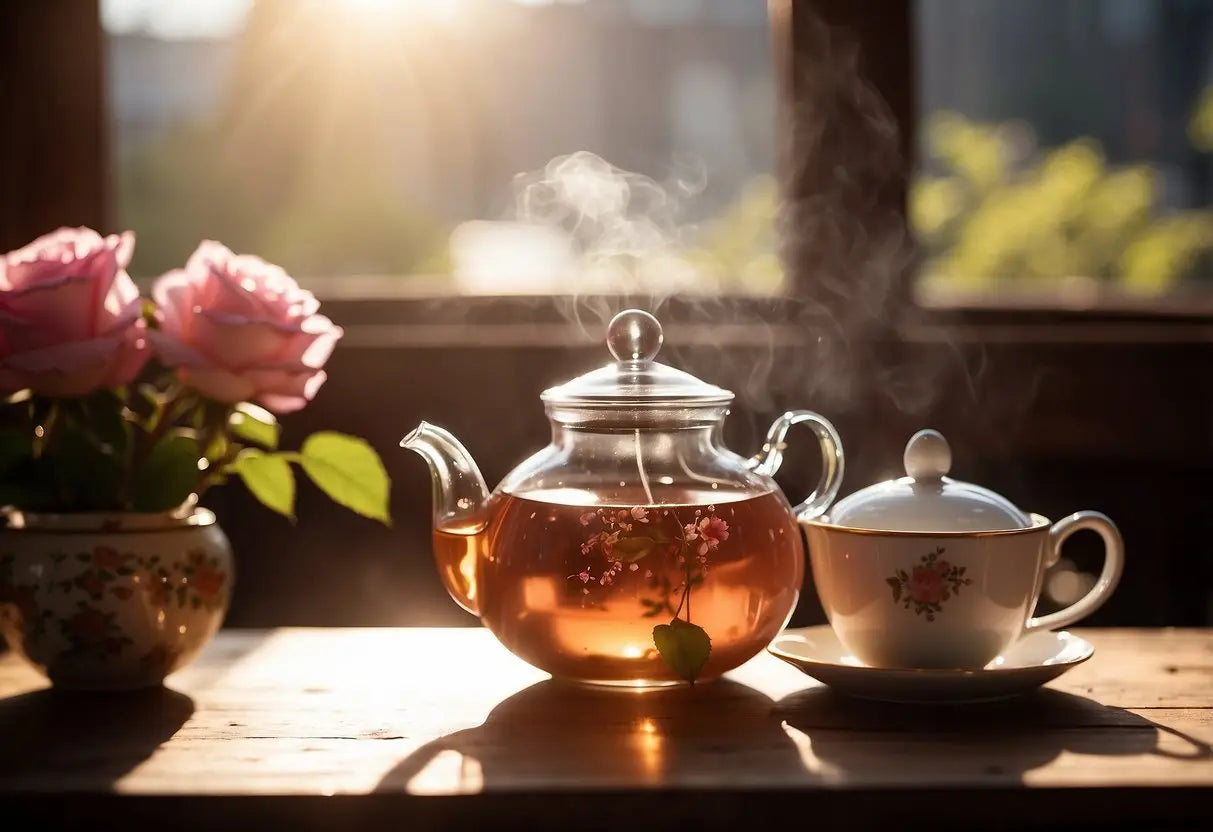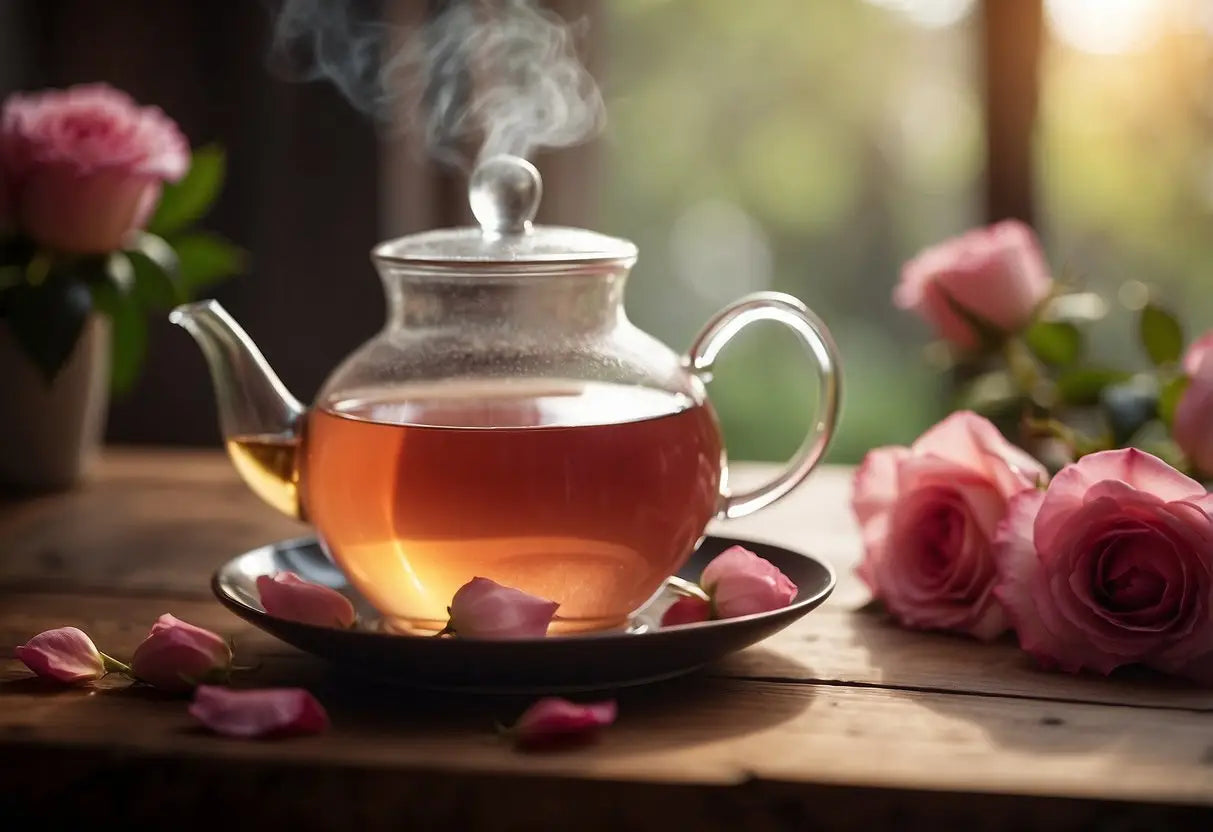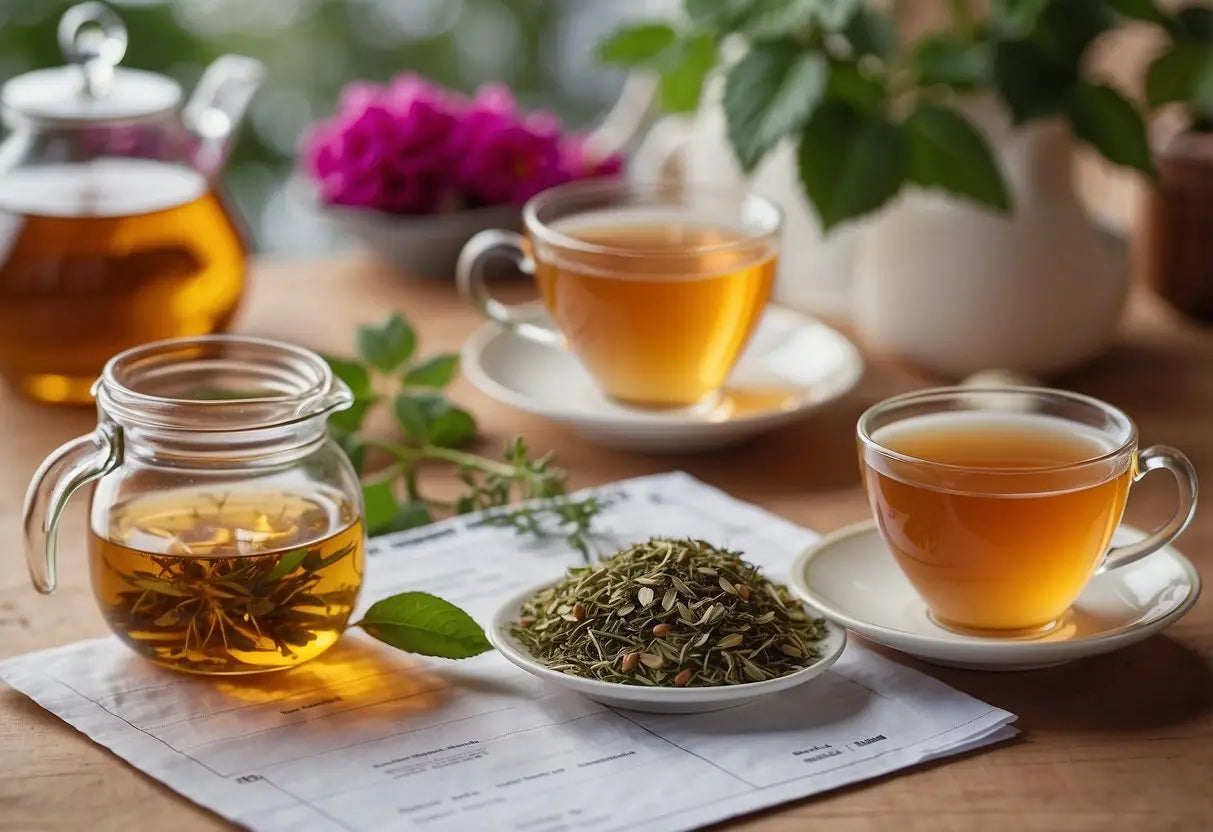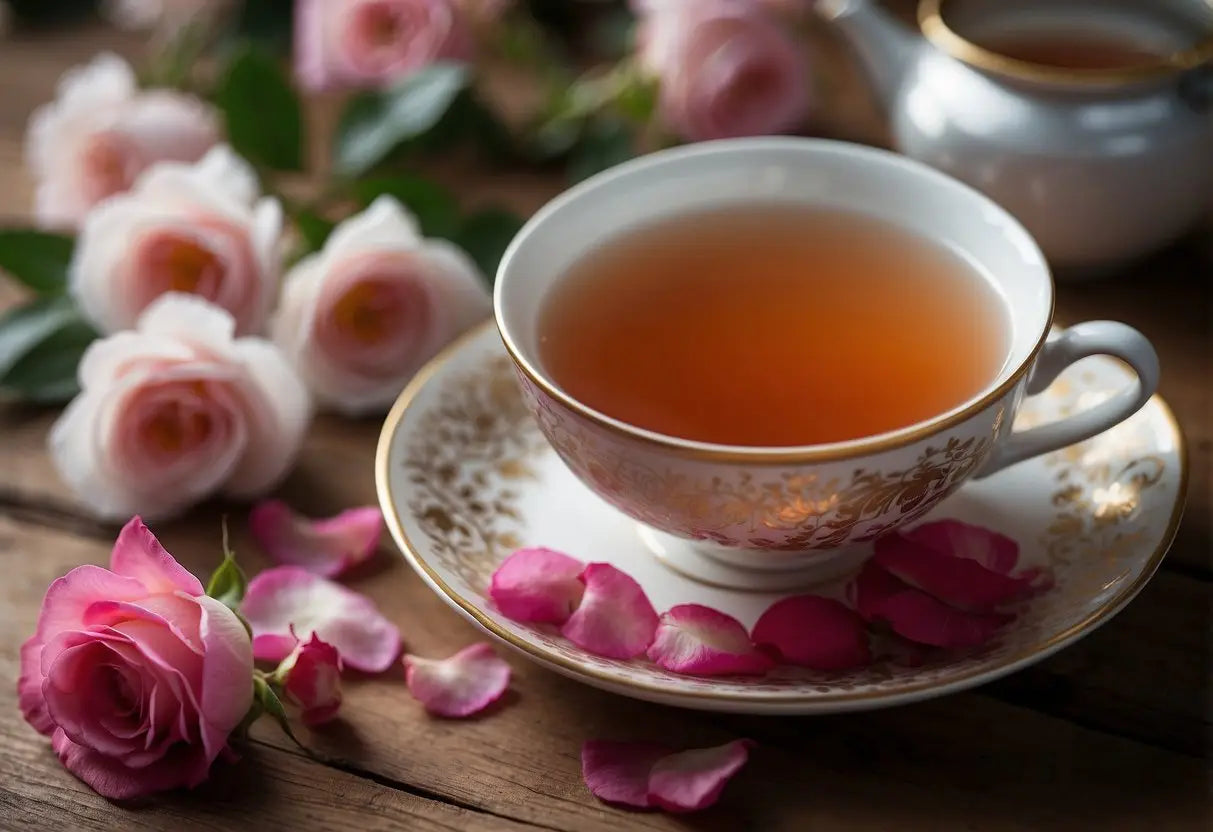Rose Tea Benefits
Rose tea has deep historical roots and comes in various types, each with unique compositions.
Historical Significance
Rose tea dates back centuries and has been cherished in many cultures for its aromatic and therapeutic properties. In traditional Chinese medicine, rose tea was used to balance energy and improve digestion. In the Middle East, it has been a staple in both culinary and medicinal practices, believed to enhance mood and aid in skin health. Victorian England popularized rose tea in social settings, adding a touch of elegance to the beverage. Understanding these historical contexts enhances appreciation for rose tea today.
Composition and Types
Rose tea is prepared mainly from dried rose petals and buds. It contains vitamins A, C, E, and antioxidants which promote skin health and boost immunity. There are several types:
Bestsellers
- Pure Rose Tea: Made solely from rose petals.
- Blended Rose Tea: Combines roses with other herbs such as hibiscus, chamomile, or green tea.
- Rosehip Tea: Utilizes the fruit of the rose plant, known for higher vitamin C content.
Each type offers distinct flavors and health benefits, making rose tea a versatile beverage option.
Health Benefits of Rose Tea

Rose tea offers a variety of health benefits, ranging from its rich antioxidant content to its support for digestive health and the immune system. It also contributes to skin health and stress relief.
Rich in Antioxidants
Rose tea is packed with antioxidants, which help combat oxidative stress in your body. Flavonoids, tannins, and anthocyanins present in rose petals protect your cells from damage. Regular consumption can support overall well-being and reduce the risk of chronic diseases. Antioxidants also play a role in promoting a youthful appearance by fighting free radicals that cause aging.
Promotes Digestive Health
Drinking rose tea can aid your digestive system. It relieves bloating and alleviates constipation. The compounds in rose petals stimulate bile production, helping your body digest food more efficiently. If you experience mild stomach issues, rose tea's natural anti-inflammatory properties may offer comfort. Including rose tea in your diet helps maintain a healthy gut.
Supports Immune System
Rose tea is a rich source of vitamin C, crucial for strengthening your immune system. Regular intake can help your body ward off infections. It also promotes healthy skin and tissue repair. Drinking rose tea may reduce the duration and severity of colds. Keep your immune system robust by incorporating this beneficial tea into your routine.
Enhances Skin Health
Consuming rose tea can benefit your skin's health. The antioxidants and anti-inflammatory properties help in reducing acne and skin irritation. Rose tea hydrates your skin from the inside, giving you a natural glow. It also contains vitamins A and E, which are essential for maintaining healthy skin. Consider rose tea for its beautifying effects.
Contributes to Stress Relief
Rose tea has soothing properties that help in reducing stress and anxiety. The natural aroma of rose petals has calming effects on your mind. Enjoying a cup of rose tea can be a relaxing ritual that promotes mental well-being. Some studies suggest that rose compounds have mild sedative effects, making this tea beneficial for winding down after a long day.
Nutritional Value of Rose Tea

Rose tea offers various health benefits, including high levels of vitamin C and essential minerals, making it a nutritious beverage choice.
Vitamin C Content
Rose tea is rich in vitamin C, an antioxidant that supports your immune system, skin health, and overall vitality. Each cup of rose tea provides a substantial portion of your daily vitamin C requirements. This nutrient helps your body fight off infections, heal wounds, and support collagen production.
Regular consumption of vitamin C through rose tea may also aid in reducing inflammation and combating oxidative stress. For those looking for a natural source of vitamin C, rose tea is an easy and pleasant way to boost intake without relying on supplements.
Lao Ban Zhang
Essential Minerals
In addition to vitamin C, rose tea contains essential minerals such as calcium, iron, and magnesium. These minerals are vital for maintaining your bone health, metabolic functions, and red blood cell production.
Calcium in rose tea assists with bone strength and dental health. Iron is crucial for transporting oxygen in your blood, preventing anemia. Magnesium plays a role in over 300 enzyme reactions, supporting muscle and nerve function. Including rose tea in your diet can contribute to meeting your daily mineral requirements effectively.
Brewing Techniques for Optimal Benefits
To enjoy the full potential benefits of rose tea, focus on selecting a suitable rose variety and paying attention to water temperature and steeping times.
Choosing the Right Rose Variety
Roses come in many varieties, but not all are suitable for tea. Look for organic and food-grade rose petals to avoid harmful chemicals. Rosa damascena and Rosa centifolia are popular choices known for their rich aroma and therapeutic properties.
Different varieties offer distinct flavors and benefits. For a calming effect, Rosa gallica is a good option. It's important to purchase from reputable sources to ensure the roses are free from pesticides. Avoid artificially colored or scented petals.
Water Temperature and Steeping Time
Proper water temperature and steeping time are crucial for extracting the beneficial compounds from rose petals. Use water heated to about 195°F (90°C). Boiling water can destroy some delicate nutrients and alter the flavor.
Steep the petals for about 5-7 minutes. Oversteeping can result in a bitter taste, while understeeping may not extract enough beneficial compounds. Use a covered teapot to retain aromatic oils. Adjust the steeping time based on your taste preference, but start with this guideline for optimal benefits.
Potential Side Effects and Considerations

While rose tea offers various benefits, you should be aware of possible side effects and considerations. Concerns include allergic reactions and possible interactions with medications.
Allergies and Sensitivities
Rose tea might cause allergies or sensitivities in some individuals. Symptoms can include itching, rashes, or stomach upset.
If you have a known allergy to roses or related plants, avoid rose tea. Conduct a patch test by applying some tea to the skin to check for reactions.
Start with small amounts of rose tea. Gradually increase the quantity to gauge your body's response. Consult a healthcare professional for advice, especially if you experience any side effects.
Possible Interactions
Rose tea can interact with certain medications or health conditions. If you are taking blood thinners, diabetic medication, or have hormone-sensitive conditions, consult your doctor before consuming rose tea.
Rose tea might affect the efficacy of birth control pills. Always confirm with healthcare professionals about any potential risks, especially if you have underlying health conditions.
Incorporating Rose Tea into Your Diet

Rose tea can be enjoyed in various ways.
Morning Boost: Start your day with a warm cup of rose tea. Its floral aroma can help wake you up gently, setting a positive tone for the day.
Midday Refreshment: Swap out your typical afternoon coffee with rose tea. This can provide a mild caffeine-free boost.
Rose Tea Recipes
Hot Rose Tea:
- Boil water.
- Add 1-2 teaspoons of dried rose petals to the teapot.
- Steep for 5-10 minutes.
Rose Iced Tea:
- Brew rose tea as usual.
- Allow it to cool.
- Serve over ice with a slice of lemon.
Combining with Other Ingredients
Rose tea pairs well with:
- Honey: Adds natural sweetness.
- Lemon: Enhances the refreshing flavor.
- Mint Leaves: Provides a cooling effect.
Serving Suggestions
With Meals: Serve rose tea with light salads or desserts. Its delicate flavor complements rather than overpowers.
As a Relaxing Beverage: Enjoy during a quiet evening. Its calming properties can help you unwind.
Storage Tips
Keep dried rose petals in an airtight container. Store in a cool, dark place to maintain freshness.
Comparative Analysis with Other Herbal Teas

Rose tea is known for its mild flavor and aromatic properties. It's derived from fresh or dried rose petals and possesses numerous health benefits.
Chamomile tea, in contrast, is noted for its calming effects. Chamomile is often used to aid sleep and reduce anxiety, thanks to its natural sedative properties.
| Aspect | Rose Tea | Chamomile Tea |
|---|---|---|
| Primary Benefit | Skin health, antioxidant-rich | Calming, aids sleep |
| Flavor | Floral, slightly sweet | Mild, apple-like |
| Active Compounds | Vitamin C, polyphenols | Apigenin, flavonoids |
Peppermint tea provides a refreshing and invigorating experience, often used to relieve digestive issues and headaches.
| Aspect | Rose Tea | Peppermint Tea |
|---|---|---|
| Primary Benefit | Skin health, antioxidant-rich | Digestive aid, headache relief |
| Flavor | Floral, slightly sweet | Minty, refreshing |
| Active Compounds | Vitamin C, polyphenols | Menthol, rosmarinic acid |
Ginger tea is renowned for its ability to soothe nausea and inflammation. It has a pungent, spicy flavor, making it quite different from rose tea.
| Aspect | Rose Tea | Ginger Tea |
|---|---|---|
| Primary Benefit | Skin health, antioxidant-rich | Anti-nausea, anti-inflammatory |
| Flavor | Floral, slightly sweet | Spicy, warm |
| Active Compounds | Vitamin C, polyphenols | Gingerol, shogaol |
Rose tea's unique floral notes and health-promoting properties offer a gentle and soothing option compared to the distinct profiles and specific therapeutic benefits of other herbal teas.
Current Research on Rose Tea Efficacy

Recent studies have explored various health benefits of rose tea. These include properties like anti-inflammatory and antioxidant effects. Researchers have found that rose petals contain compounds that can reduce oxidative stress.
A 2021 study highlighted rose tea's potential in easing menstrual pain. Women reported reduced cramps and discomfort after consuming the tea regularly.
| Study Year | Focus Area | Key Finding |
|---|---|---|
| 2021 | Menstrual pain relief | Reduced cramps and pain |
| 2019 | Antioxidant properties | Lowered oxidative stress |
| 2020 | Anti-inflammatory effects | Decreased inflammation |
Another notable feature is its ability to improve digestion. Research indicates that rose tea can alleviate common digestive issues like bloating and constipation.
Scientists also examined rose tea's calming effects. It has shown promise in reducing anxiety and promoting a sense of well-being. This makes it a popular choice for stress relief.
In a 2019 study, participants drinking rose tea experienced better sleep quality. This was linked to the tea's mild sedative properties.
Research on rose tea continues to grow, supported by a growing body of evidence. Each study contributes to a better understanding of its potential benefits, paving the way for more comprehensive applications in health and wellness.
← Older post Newer post →











